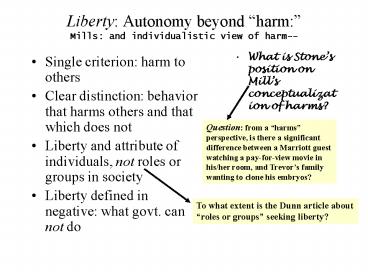Liberty: Autonomy beyond - PowerPoint PPT Presentation
1 / 2
Title: Liberty: Autonomy beyond
1
Liberty Autonomy beyond harmMills and
individualistic view of harm--
- What is Stones position on Mills
conceptualization of harms?
- Single criterion harm to others
- Clear distinction behavior that harms others
and that which does not - Liberty and attribute of individuals, not roles
or groups in society - Liberty defined in negative what govt. can not do
Question from a harms perspective, is there a
significant difference between a Marriott guest
watching a pay-for-view movie in his/her room,
and Trevors family wanting to clone his embryos?
To what extent is the Dunn article about roles
or groups seeking liberty?
2
How do two quotes (right) relate to terms (left)?
- What is meant by a sphere of legitimate
compulsion? - Who has power over our liberty?
- How does info. tech. affect our liberty?
- Give examples of non-individual harms
- Structural
- Accumulated
- The right not to be socially responsible
Adrienne Ross has a blunter assessment. "To me,"
she told me, "it's like, how dare they tell me
that I cannot save my son's life? It's as simple
as that. You know, if you want to practice your
religion, practice your religion. But not when it
interferes with other people's lives." She
continued, "They're telling me, 'Let your child
die, because my religious belief is more
important than your child's life.' They can make
their choices for their own embryos and they can
make their choices for their own children. But
they have no right to stop me from saving my
son's life."
- President Bush had created (an ethics) panel to
advise him on controversial matters such as
stem-cell research and cloning. "You can help be
the conscience of the country," the President
told his new advisers, adding that they would
"help people ... come to grips with how medicine
and science interface with the dignity of life,
and the notion that life isyou know, that there
is a Creator."































